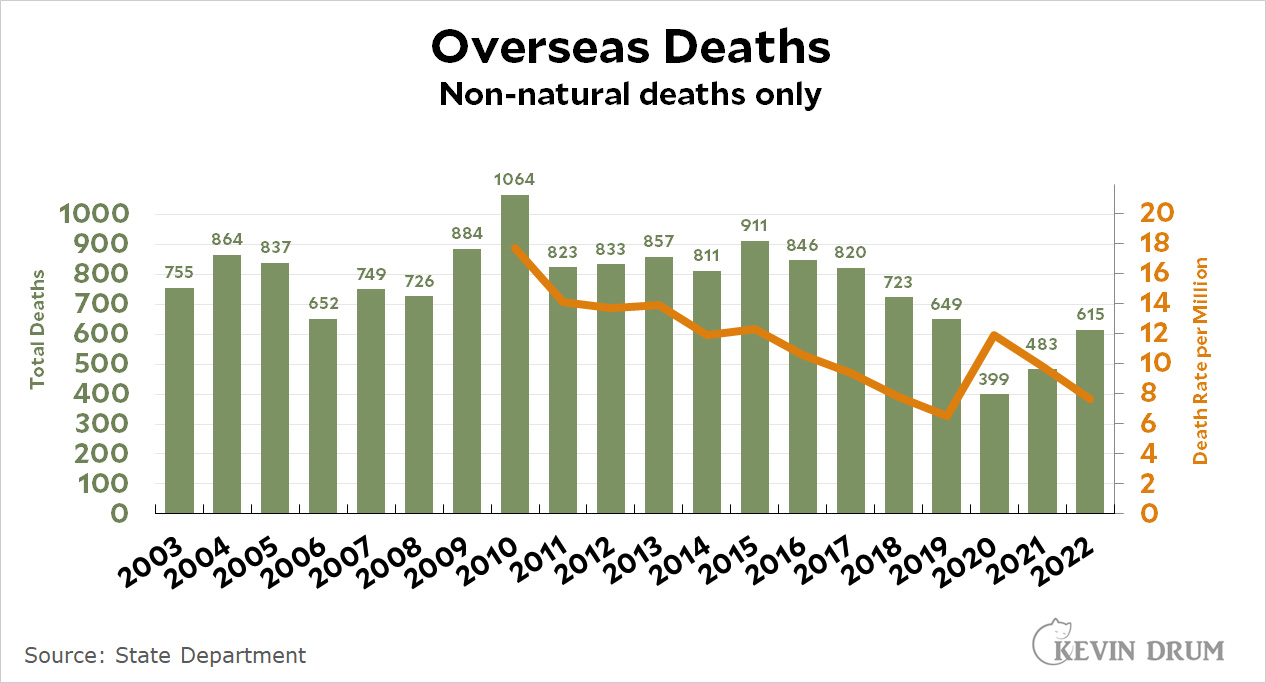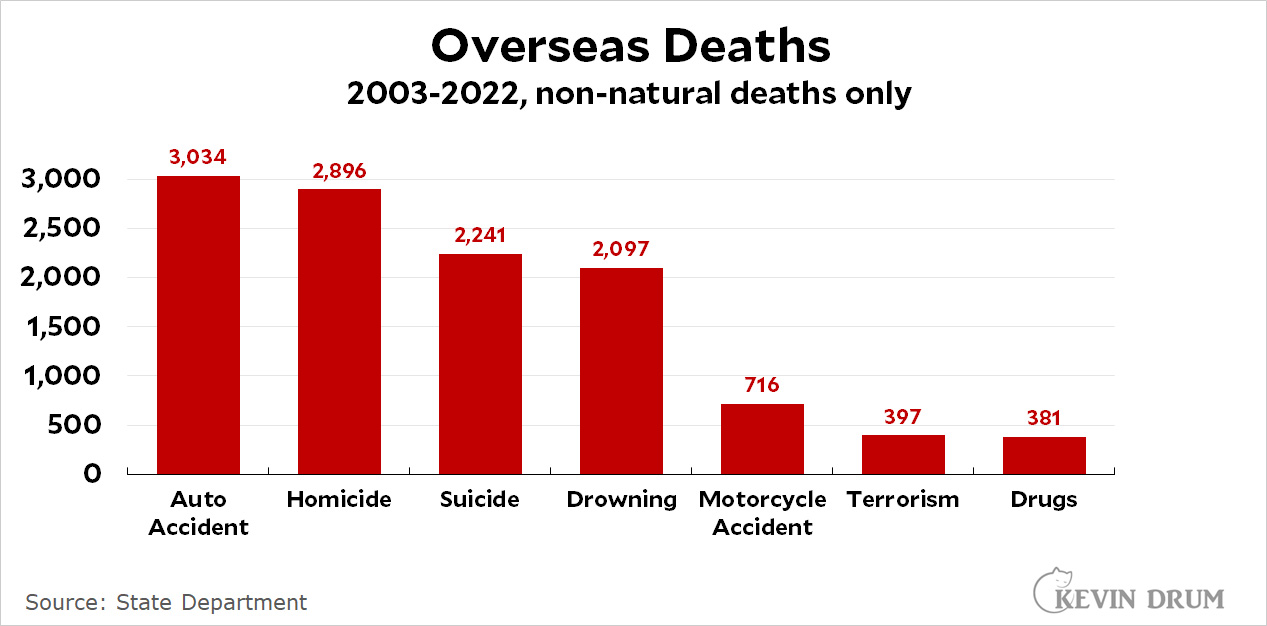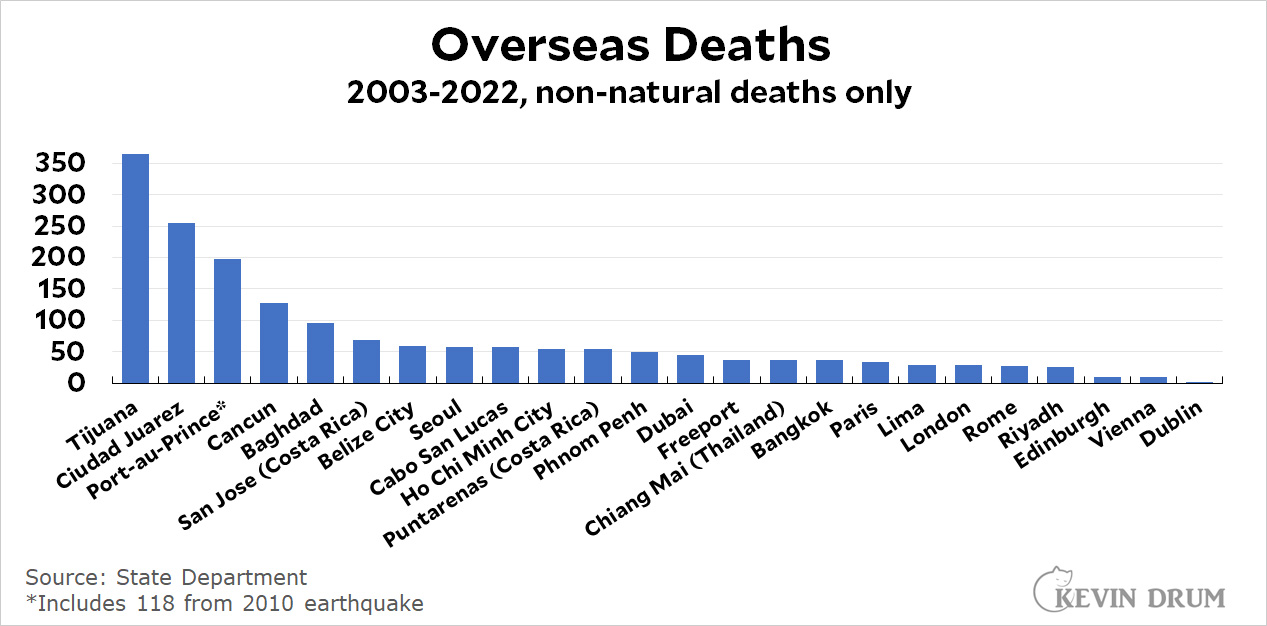I accidentally found myself last night on the home page of the State Department's list of (non-natural) overseas deaths, which Congress has required it to compile since 2003. I learned a few things:
- Americans like to go to sunny places and then drown themselves.
- Man, do a lot of Americans die in Mexico.
- An awful lot of Americans travel overseas to commit suicide.
You want some stats? I've got 'em. First, here are overseas deaths by year:
 Good news! I plotted deaths versus number of overseas trips and it looks like travel to foreign countries has gotten safer and safer. In 2010, about 18 travelers per million met an untimely demise. By 2022 that was down to 8 per million.
Good news! I plotted deaths versus number of overseas trips and it looks like travel to foreign countries has gotten safer and safer. In 2010, about 18 travelers per million met an untimely demise. By 2022 that was down to 8 per million.
Here are the most popular ways to die:
 Auto accidents for the win! If you put together all road accidents (auto, bus, motorcycle) it's the biggest category by a landslide.
Auto accidents for the win! If you put together all road accidents (auto, bus, motorcycle) it's the biggest category by a landslide.
Finally, here are the most dangerous places. This is not really very useful since obviously places with lots of visitors will also have lots of deaths. Also, the State Department does a lousy job of standardizing place names, so these numbers aren't 100% accurate.
 That said, Tijuana takes the fatality honors. It's the most dangerous city in the most dangerous country for non-natural American deaths. Unsurprisingly, your basic European tourist destinations (London, Paris, Rome) are pretty safe. You might have a heart attack there, but you probably won't die of non-natural causes.
That said, Tijuana takes the fatality honors. It's the most dangerous city in the most dangerous country for non-natural American deaths. Unsurprisingly, your basic European tourist destinations (London, Paris, Rome) are pretty safe. You might have a heart attack there, but you probably won't die of non-natural causes.
I should note that this list is semi-random. I chose all the places with very high death counts except that I got bored with Mexico after a while and gave up. Aside from that, I included popular places plus places that seemed to have an awful lot of deaths considering their (probably) small number of American visitors. Riyadh, anyone? Seoul? Phnom Penh? Chiang Mai?

Pet peeve: can we please stop labeling vehicular crashes as "accidents"? It tends to obscure the fact that most collisions and crashes are due to some human taking (or neglecting to take) an action that has consequences. Very few collisions are actually accidents.
So, "carelessness"? "Operator error"? Seems as if either of these, likely more accurate, descriptions would invoke potential legal responses as regards "liability."
Make $280 per hour. Getting a job is not easy. In any case, you have access to a wealth of resources to help you with your work style. Become motivated to promote hundreds of jobs through job vx05 boards and career websites.
Take a look at this............................. https://paymoney33.blogspot.com/
Practically all traffic accidents are cause by human error, which is the inevitable consequence of being human. Unless the collision was done purposely, I don't see how it is not an accident. If it was due to gross negligence, under the influence, or recklessness activities, then there would likely be criminal legal consequences.
That's the term used by the State Department, not Kevin.
And then there's the whole deal with the definition of "accident". If you go by the "something happened by chance", then yeah, it's not an accident. However, if you go by the "something unexpected and unintentional", then it's an accident. Both definitions are in the dictionaries.
Je suis d'accord. Almost invariably inattention of an operator, inexperience/ignorance of an operator, poor decision making by an operator, and finally self-centeredness of an operator result in collisions and/or the vehicle undergoing forces it was not meant to withstand.
Predictable is preventable.
Shunts!
Can we stop pretending that accident means random event. Accidents are unintended. Yes, there's a proximate cause, but they're still accidents.
I'd have thought anacondas and sharks and komodo dragons would have ranked a lot higher. And Australian spiders.
Will probably see a big tick-up if Orange Jesus wins in 2024.
Riyadh, anyone? Seoul? Phnom Penh? Chiang Mai?
Sounds like places spies and other shady characters would hang out.
With regard to traffic deaths, I would think that there would be more in countries where traffic moves opposite of the US.
With regard to suicides, I wonder how many were terminally ill and found a country that allowed them to be euthanized.
You usually have to be a citizen or long term resident or something.
I think some of the more obscure places with higher death counts are places where a relatively large number of expats have settled, rather than traveled to for vacation or work.
Also does it include US armed forces posted over seas? Which would definitely help explain Seoul
Happy New Year!!
None of us die in Canada?
People don't go to Canada to engage in irresponsible partying. They go to Mexico for that.
Looking at the list, I noticed right away that popular destinations whose "brand" is basically "place you go to have fun irresponsibly" rank high. Tijuana and Ciudad Juarez lead the pack because they are very popular, being both close to the border and close to major US population centers, *and* have a reputation for the kind of "fun times" that can get people killed.
No Canadian cities? There were 24 million US visitors to Canada in 2019 so some must have died.
Are places like Cd Juarez and Tijuana really travel destinations in the same sense as the rest of the places?
Everywhere else are places where people would spend some time vacationing or for work (as in they actually plan a trip there), while Juarez and Tijuana being border cities are places where a lot of people would just cross for a few hours and then come back, so the dynamics of what people do there (both legal and illegal) would be quite different.
Nobody ever dies in Canada. The place that caught my attention was Puntarenas. A quick Google church lead me to high surf, drug deals and police corruption (I was reading about an American Sandusky who apparently was tortured and killed for informing on the police) and accidents. For a town of 40000 the number is quite high but it looks like all the major causes are applicable there.
Really surprised that you didn't adjust for overall numbers of visitors.
I’m traveling to Baja tomorrow, through Cabo (not Tijuana thankfully), and am going again in January, with a transfer in Cancun. I’ve been traveling there since I was a kid, with no problems (my most scary travel near-incident was in Peru). Thank you for ruining my day!
Hold on, Dublin! HERE WE COME!
I suspect chiang mai is a more popular U.S. tourist destination than you think it is.
I looked at this awhile ago, and it seemed that even more than motor vehicle accidents, the biggest cause of death was heart attacks.
It also appeared that the risk of dying in most countries is exceeded by the risk of dying in the US just by motor vehicle accidents.
From Statistica:
39M visit Mexico (4415 deaths) v.
15M visit Canada (212 deaths) v
3.9M visit UK (148 deaths)
Also, a rough estimate is that about 125 of the "terrorist deaths" happened in Iraq.